 Backend Development
Backend Development PHP Tutorial
PHP Tutorial Security comparison of PHP and CGI and how to improve website protection
Security comparison of PHP and CGI and how to improve website protectionSecurity comparison of PHP and CGI and how to improve website protection
With the rapid development of the Internet, websites have increasingly become one of the important ways for people to obtain information and communicate. However, the accompanying network security threats are becoming increasingly serious, and website security issues have become one of the focuses of people's attention. PHP and CGI are commonly used website development languages, and their security has attracted much attention. This article will compare the security of PHP and CGI and provide some methods to improve the security of protecting your website.
PHP is an open source server-side scripting language that is widely used in website development. In contrast, CGI (Common Gateway Interface) is a protocol that allows external programs to interact with an HTTP server. PHP runs on the server side, while CGI can be used by many different types of scripting languages. From this perspective, PHP is more vulnerable because its code can run directly on the web server and is easily attacked directly by hackers.
In PHP and CGI, the most common security problem is code injection attacks, such as SQL injection and cross-site scripting (Cross-Site Scripting, XSS) attacks. Each of these attacks is described below, along with some code examples to illustrate how to improve the security of your site.
The first is SQL injection attack. SQL injection attacks are attacks that access or modify the database by embedding malicious SQL code in user input. To prevent SQL injection attacks, we can use prepared statements to reduce the risk. The following is an example of PDO prepared statements using PHP:
<?php
$dsn = 'mysql:host=localhost;dbname=test';
$username = 'root';
$password = '';
try {
$pdo = new PDO($dsn, $username, $password);
$pdo->setAttribute(PDO::ATTR_ERRMODE, PDO::ERRMODE_EXCEPTION);
$stmt = $pdo->prepare('SELECT * FROM users WHERE username = :username');
$stmt->bindParam(':username', $_POST['username']);
$stmt->execute();
$result = $stmt->fetch(PDO::FETCH_ASSOC);
} catch(PDOException $e) {
echo 'Error: ' . $e->getMessage();
}
?> In this example, we use the bindParam function to bind the value entered by the user to avoid the injection of malicious code.
The second is cross-site scripting attacks. Cross-site scripting is an attack that allows an attacker to insert malicious code into a user's browser. In order to prevent cross-site scripting attacks, we can use PHP's htmlspecialchars function to escape user input. The following is an example:
<?php $username = htmlspecialchars($_POST['username'], ENT_QUOTES, 'UTF-8'); echo 'Welcome, ' . $username; ?>
In this example, we use the htmlspecialchars function to escape the special characters in the user input to prevent the execution of malicious code.
In addition to the above two examples, there are some other ways to improve the security of your website. These include using an appropriate password policy, including strong password requirements and regular password changes; implementing access control measures, such as limiting the number of login attempts and using two-factor authentication; and regularly updating the website's software and plug-ins.
To sum up, PHP and CGI are commonly used website development languages, and their security has attracted much attention. However, by using prepared statements and escaping user input, we can greatly reduce the risk of SQL injection and cross-site scripting attacks. Additionally, there are some other ways to improve the security of your website. When writing website code, we should always keep the importance of website security in mind and take appropriate measures to protect the website.
The above is the detailed content of Security comparison of PHP and CGI and how to improve website protection. For more information, please follow other related articles on the PHP Chinese website!
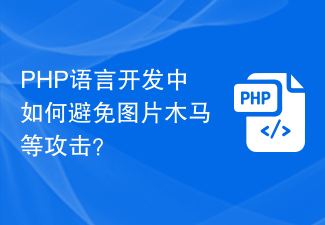 PHP语言开发中如何避免图片木马等攻击?Jun 09, 2023 pm 10:37 PM
PHP语言开发中如何避免图片木马等攻击?Jun 09, 2023 pm 10:37 PM随着互联网的发展,网络攻击事件时有发生。其中,黑客利用漏洞进行图片木马等攻击已经成为常见的攻击手段之一。在PHP语言开发中,如何避免图片木马等攻击呢?首先,我们需要了解什么是图片木马。简单来说,图片木马就是指黑客在图片文件中植入恶意代码,当用户访问这些图片时,恶意代码会被激活并攻击用户的计算机系统。这种攻击手段常见于网页、论坛等各种网站。那么,如何避免图片木
 PHP安全性指南:防止HTTP参数污染攻击Jun 29, 2023 am 11:04 AM
PHP安全性指南:防止HTTP参数污染攻击Jun 29, 2023 am 11:04 AMPHP安全性指南:防止HTTP参数污染攻击导言:在开发和部署PHP应用程序时,保障应用程序的安全性是至关重要的。其中,防止HTTP参数污染攻击是一个重要的方面。本文将介绍什么是HTTP参数污染攻击,以及如何通过一些关键的安全措施来防止这种攻击。什么是HTTP参数污染攻击?HTTP参数污染攻击是一种非常常见的网络攻击技术,它利用了Web应用程序在解析URL参数
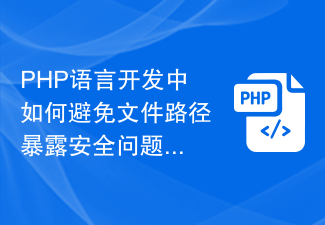 PHP语言开发中如何避免文件路径暴露安全问题?Jun 10, 2023 pm 12:24 PM
PHP语言开发中如何避免文件路径暴露安全问题?Jun 10, 2023 pm 12:24 PM随着互联网技术的不断发展,网站的安全问题也日趋突出,其中文件路径暴露安全问题是较为普遍的一种。文件路径暴露指的是攻击者可以通过一些手段得知网站程序的目录信息,从而进一步获取网站的敏感信息,对网站进行攻击。本文将介绍PHP语言开发中的文件路径暴露安全问题及其解决方法。一、文件路径暴露的原理在PHP程序开发中,我们通常使用相对路径或绝对路径访问文件,如下所示:相
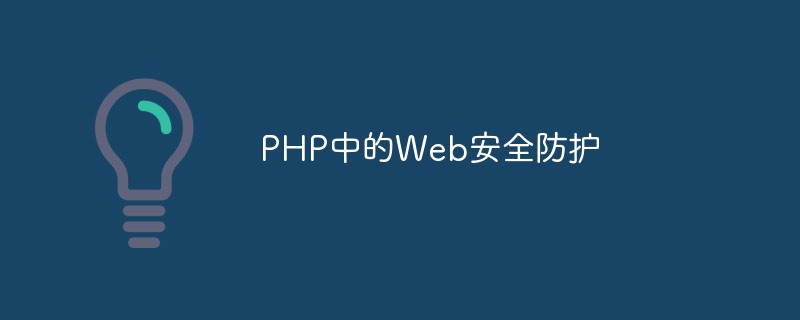 PHP中的Web安全防护May 25, 2023 am 08:01 AM
PHP中的Web安全防护May 25, 2023 am 08:01 AM在现今互联网社会中,Web安全已经成为了一个重要的问题。特别是对于使用PHP语言进行Web开发的开发人员来说,常常会面对各种安全攻击和威胁。本文将从PHPWeb应用的安全入手,讨论一些Web安全防护的方法和原则,来帮助PHPWeb开发人员提高应用的安全性。一、理解Web应用安全Web应用安全是指Web应用程序处理用户请求时,保护数据、系统和用户的安全性。
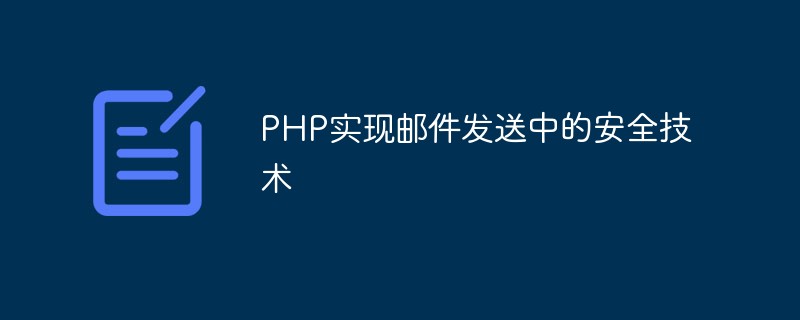 PHP实现邮件发送中的安全技术May 23, 2023 pm 02:31 PM
PHP实现邮件发送中的安全技术May 23, 2023 pm 02:31 PM随着互联网的迅速发展,邮件已经成为了人们日常生活和工作中不可或缺的一部分,邮件的传输安全问题已经引起了越来越多的关注。PHP作为一种广泛应用于Web开发领域的编程语言,也扮演着实现邮件发送中安全技术的角色。本文将介绍PHP在邮件发送中如何实现以下安全技术:SSL/TLS加密传输邮件在互联网中传输的过程中,可能会被攻击者窃取或篡改,为了防止这种情况的发生,可以
 PHP中如何进行数据安全和信息隐私保护?May 21, 2023 pm 08:21 PM
PHP中如何进行数据安全和信息隐私保护?May 21, 2023 pm 08:21 PM随着互联网的快速发展,数据安全和信息隐私保护变得越来越重要。尤其是在Web应用程序中,用户的敏感数据和隐私信息需要得到有效的保护。PHP是一种流行的服务器端编程语言,它可以被用来构建强大的Web应用程序。但是,PHP开发人员需要采取一些措施来确保数据的安全和保护用户的隐私。以下是一些关于在PHP中进行数据安全和信息隐私保护的建议。使用密码哈希算法密码哈希算法
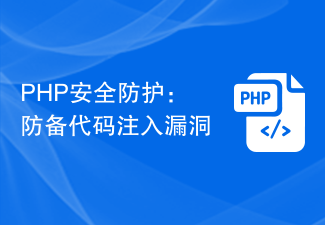 PHP安全防护:防备代码注入漏洞Jun 24, 2023 am 09:30 AM
PHP安全防护:防备代码注入漏洞Jun 24, 2023 am 09:30 AM随着互联网时代的到来,PHP作为一种开源脚本语言,被广泛应用于Web开发中,特别是在动态网站的开发中扮演着重要的角色。然而,安全问题却也成为了PHP发展中不可忽视的问题。其中,代码注入漏洞因为其难以防范和致命的危害,一直是Web安全领域的热门话题之一。本文将介绍PHP中代码注入漏洞的原理、危害及其预防方法。一、代码注入漏洞的原理和危害代码注入漏洞又称为SQL
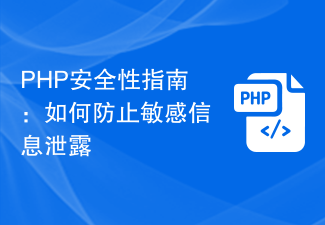 PHP安全性指南:如何防止敏感信息泄露Jun 29, 2023 am 11:29 AM
PHP安全性指南:如何防止敏感信息泄露Jun 29, 2023 am 11:29 AMPHP安全性指南:如何防止敏感信息泄露引言:随着互联网的迅速发展,信息安全已经成为一个日益重要的话题。特别是对于网站开发者来说,保护用户的敏感信息是至关重要的。本文将介绍一些PHP安全性的最佳实践,以帮助开发者防止敏感信息泄露。加密和解密加密是一种保护敏感信息的重要方法。使用PHP内置的加密函数,如base64_encode()和base64_decode(


Hot AI Tools

Undresser.AI Undress
AI-powered app for creating realistic nude photos

AI Clothes Remover
Online AI tool for removing clothes from photos.

Undress AI Tool
Undress images for free

Clothoff.io
AI clothes remover

AI Hentai Generator
Generate AI Hentai for free.

Hot Article

Hot Tools

mPDF
mPDF is a PHP library that can generate PDF files from UTF-8 encoded HTML. The original author, Ian Back, wrote mPDF to output PDF files "on the fly" from his website and handle different languages. It is slower than original scripts like HTML2FPDF and produces larger files when using Unicode fonts, but supports CSS styles etc. and has a lot of enhancements. Supports almost all languages, including RTL (Arabic and Hebrew) and CJK (Chinese, Japanese and Korean). Supports nested block-level elements (such as P, DIV),

MantisBT
Mantis is an easy-to-deploy web-based defect tracking tool designed to aid in product defect tracking. It requires PHP, MySQL and a web server. Check out our demo and hosting services.

SAP NetWeaver Server Adapter for Eclipse
Integrate Eclipse with SAP NetWeaver application server.

Atom editor mac version download
The most popular open source editor

MinGW - Minimalist GNU for Windows
This project is in the process of being migrated to osdn.net/projects/mingw, you can continue to follow us there. MinGW: A native Windows port of the GNU Compiler Collection (GCC), freely distributable import libraries and header files for building native Windows applications; includes extensions to the MSVC runtime to support C99 functionality. All MinGW software can run on 64-bit Windows platforms.





